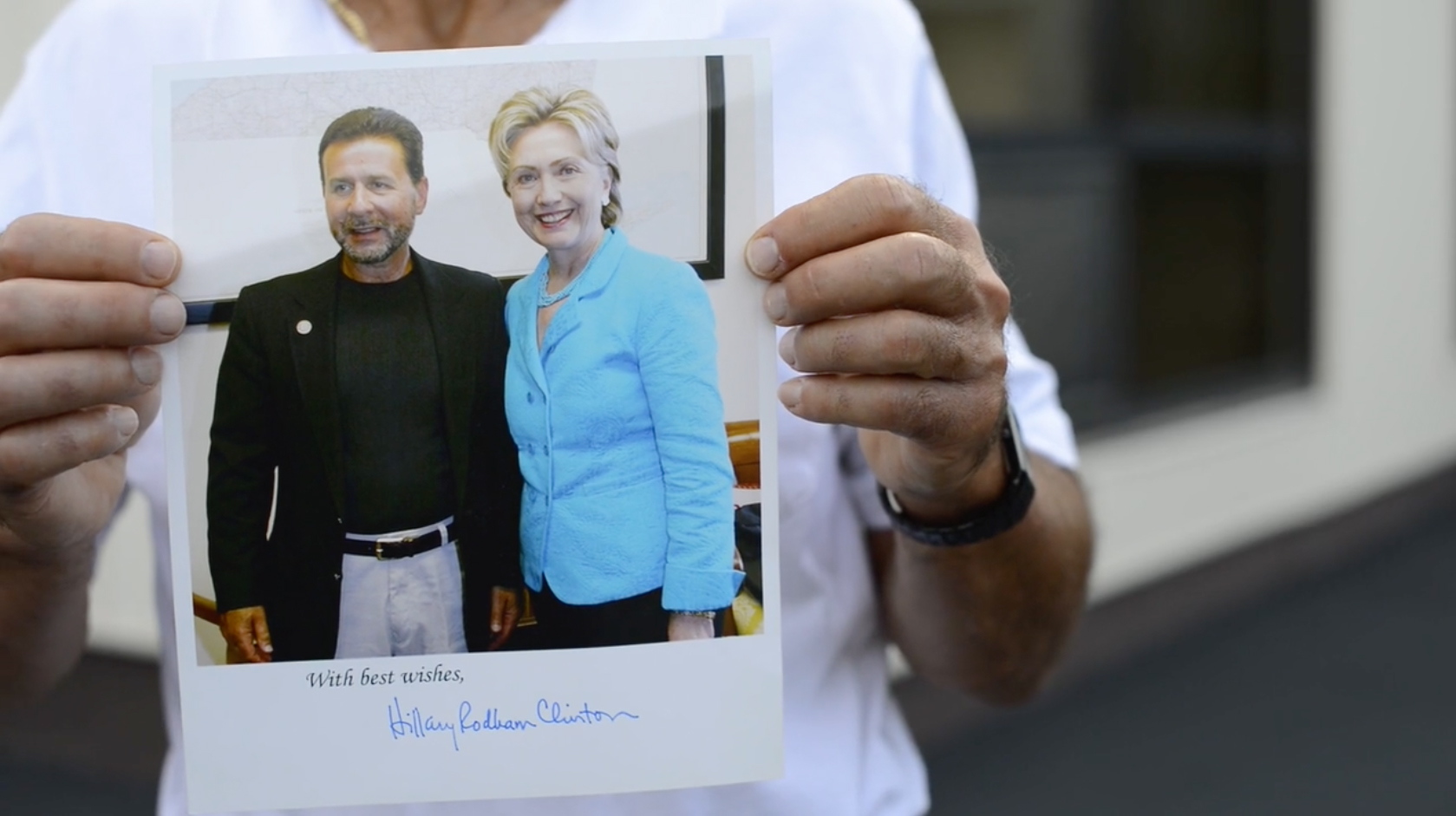On a Friday evening in late September 2004, Dave Falletta says he was looking into the void.

|
| Local 97’s then-Business Manager Dave Faletta pictured with Clinton after the lockout was averted. The image was taken from a video about Clinton’s intervention that can be seen here.
|
Falletta was then business manager of Syracuse, N.Y., Local 97, a utility local with more than 4,000 members working for National Grid, and their contract had expired on Monday. There was nothing to replace it.
“A lot of [new] contracts come in late: right at the end of the contract or you extend a week or so because you know you will get there. But those are normal situations. There was nothing normal about this,” Falletta said. “There were no agreements to extend. There was nothing but wide open expanse that we could have just fallen into the hole and never come out of it.”
Falletta had never negotiated with National Grid before. The UK-based company purchased the storied local power utility, Niagara Mohawk, for nearly $9 billion in 2000, and National Grid had a very different way of doing business.
“National Grid was known to be a very successful company with holdings all over the world with a reputation for letting nothing get in their way, maybe even a bit nasty. They were what was called a turnkey company: small in-house workforce and subcontract everything,” Falletta said.
As negotiations began in the summer, it became clear that the company was following the same strategy they had used when they bought a Massachusetts utility.
“They beat hell out of the unions there,” Falletta said. “The CEO all but told me to prepare myself.”
National Grid didn’t want 4,000 workers. It didn’t want entire classifications covering hundreds of workers. It was so bad that Third District International Representative Richie Redmond, who was helping with the negotiations, thought continuing with the company was a waste of time.
“It was obvious it was going to a strike or a lockout. It was that bad,” Redmond said.
And after months of negotiations, the company gave Falletta a “firm, final last package” that he took to the members for a vote. He recommended they vote it down. Ninety percent took his advice.
John Satunas was Local 97’s political coordinator. Throughout the negotiation he had been reaching out to all the elected officials he could find: city, county, local, state, even their representatives in Congress.
When Local 97 held a rally in front of the company’s Syracuse headquarters, there was a good showing from local elected officials and representatives from Clinton’s and Sen. Charles Schumer’s offices were there.
“We had a lot of support, but the company did not budge,” Satunas said.
It was clear: when the contract expired, the company would lock them out.
“We knew we were facing our worst fear: loss of our wages, loss of our medical benefits and the loss of our work and we weren’t sure how we were going to negotiate everybody back on the property,” Falletta said.
In the final week before the contract expired, Satunas said he called every elected official he could one more time.
“When it got down to the nitty gritty, I always reached out to the senators. I told a Clinton staffer I’d gotten to know what was going on, but she knew. It was in all the papers. I told her I think we need the senator to make a phone call,” Satunas said. “Next thing I know, Clinton called.”
(The IBEW produced a video about Clinton’s intervention that can be seen here.)
It was late Friday night at the Local 97 hall when Falletta picked up the phone. Clinton was in California, campaigning for Sen. John Kerry’s presidential bid. She asked how specifically she could help.
“I told her clearly, I needed her to convince the company to come back to the table and bargain. None of our friends in the state at any level had any luck doing that,” Falletta said.
He gave her five issues including job security, benefits and seniority that he needed some movement on from the company.
“I told her if I got movement on all five, I believed I could get a contract I could get ratified,” he said. “Then I prepared to for the lockout.”
So Falletta wasn’t surprised that there was no word all day Saturday.
Which made the phone call Sunday morning from National Grid’s vice president of operations all the more of a surprise. The company, he said, was willing to come back to the table and negotiate on five topics, and only five topics.
The five Falletta had mentioned to Clinton.
“I have never seen something happen so fast. I have no idea what she told the company, but whatever she said, it worked,” Satunas said. “It was set in stone before that.”
Falletta said they went back into negotiations that afternoon and, before dark, had an agreement.
“She didn’t hold a press conference to take credit, didn’t call all the newspapers to say what she had done, but we know,” Falletta said.
When the contract was put to a vote several weeks later, more than 80 percent supported it. Falletta and Satunas both said it is a testament to the even-handedness of the deal that the contract has been extended from 2004 to today.
“Hillary Clinton performed a miracle for those 4,000 workers and their families. In the most dangerous situation a union can be in, she did the job for us,” Falletta said.
Homepage Photo credit: Photo used under a Creative Commons license courtesy of Flickr user Peter Dutton